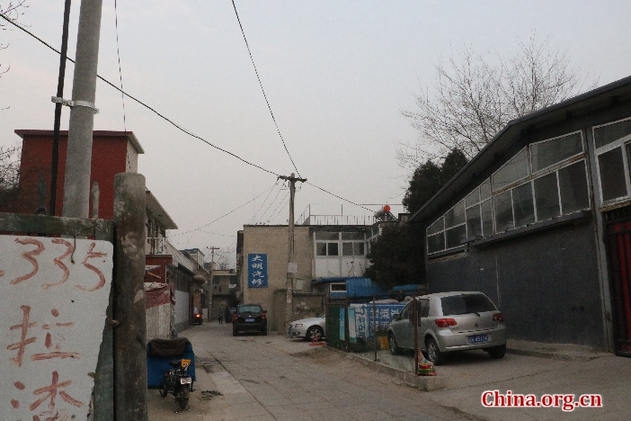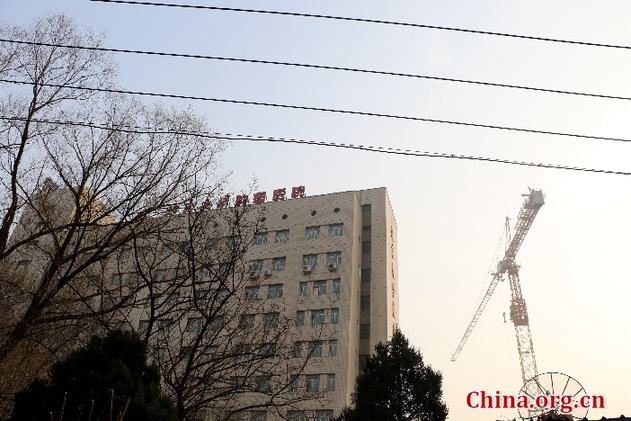'Cancer hotels' in Beijing: Hope and woe
- By He Shan and Zhang Lulu
 0 Comment(s)
0 Comment(s) Print
Print E-mail China.org.cn, January 13, 2017
E-mail China.org.cn, January 13, 2017
Behind the Beijing Cancer Hospital, one of China's most famous hospitals for the treatment of cancer, is a desolate park under renovation. At one corner of the park is a dilapidated area, with a run-down car repair shop on the outside and a frozen, lifeless river nearby. This quarter is home to a number of what have come to be known as "cancer hotels." Despite the name, these are not hotels in the traditional sense, but spare rooms within people's homes that are rented to patients and their families seeking treatment in the hospital, which is just a three-minute walk away.
![The hallway of a rundown cancer hotel near the Beijing Cancer Hospital on Jan. 4, 2017. [Photo by Zhang Lulu/China.org.cn] The hallway of a rundown cancer hotel near the Beijing Cancer Hospital on Jan. 4, 2017. [Photo by Zhang Lulu/China.org.cn]](http://images.china.cn/attachement/jpg/site1007/20170112/00016c42b41619e1566001.jpg) |
|
The hallway of a rundown cancer hotel near the Beijing Cancer Hospital on Jan. 4, 2017. [Photo by Zhang Lulu/China.org.cn] |
Underground cancer hotels
Ms. Zhang, a woman in her 60s who declined to give her full name, runs one such hotel. Her hotel, like the others tucked secretively in the area near the hospital, looks like an ordinary brick house from the outside, but when one lifts the thick black-and-blue blanket on the door (which is used in winter to block heavy wind), one finds a two-story modest house, crammed with cartons, groceries and a variety of other things.
Each room in Zhang's hotel is less than 12 square meters, with nothing more than three or four beds and a TV set. The guests share a communal toilet, which the attentive Zhang tidies up every morning. A communal kitchen lies on each floor, enabling patients to cook for themselves. A room costs 100 yuan (US$14.5) to 120 yuan per night, less than half of the price of the budget hotels nearby.
"The kitchen is really helpful, they can cook for themselves. Think how much they could have to pay staying in an average hotel!" Zhang said.
Patients coming from outside Beijing to be treated in the city's hospitals often have to wait for check-ups, diagnoses and treatment, which can take a considerable amount of time. In order not to add to the often staggering medical bills, many patients resort to staying at the relatively cheap cancer hotels nearby, which have sprung up in major Chinese cities in recent years.
A total of 4.3 million cancer cases were diagnosed in China in 2015, or almost 12,000 cases per day. About 2.81 million people, or 7,500 people every day, died from cancer that year.
Ms. Zhang and many of her guests have become friends, and she listens to their woeful tales when they need a sympathetic ear.
A man in his 40s diagnosed with lung cancer had to go home without further treatment, as the family had reached the end of their means and had a son in college to support. The man's wife, who did not tell her husband the truth, confided to Zhang during a long night of tears.
Zhang is particularly saddened by young patients. She talked about a fresh college graduate who was misdiagnosed with breast cancer in her hometown and had her breasts cut off for nothing.
"She was so pretty you know. How is she going to date and get married? So young!" she bemoaned.
Though not providing the services one often finds in an average hotel, Zhang lends a helping hand whenever she can. "They often don't know where to find the most suitable hospitals for their specific illnesses as they are from outside the city, so I often tell them where to find the best hospitals and doctors," she said, taking out a notebook where she keeps the information and experience gained as a Beijing native familiar with many of the city's hospitals, which number over 1000.
Zhang and her neighbors who run such hotels shy away from the media, as the hotels are not officially registered. To register the hotels would incur costs relating to security, fire control and many other things, for which the patients would have to bear the brunt, Zhang said.
Some of her guests never come back, which means they have probably given up hope, but some have their illnesses cured here, Zhang said.
 |
|
Rows of two-story brick buildings, known locally as "cancer hotels," act as cheap accommodation to cancer patients seeking treatment in Beijing, on Jan. 4, 2017. [Photo by He Shan/ China.org.cn] |
'Beijing has the best doctors and equipment'
A 60-year-old man from central China's Henan Province, who preferred to remain anonymous, was one of the cancer hotel occupants in the rundown area. He has been in Beijing with his wife since May 2016.
He said he used to stay in nearby budget hotels which cost about 300 yuan a night, but later moved to an 80-yuan-a-night room with two beds in the cancer hotel.
The man, wearing an apparently fake fur coat and a white-and-green mask, was strolling in the dense grayish smog near the hospital with his wife in the afternoon. They went to a nearby market to buy some Chinese pancakes and pork -- a rather meager dinner -- to cook at their hotel kitchen.
He said he began to cough and had a persistent fever in January 2016. A check-up at a local hospital in the city of Cangzhou of Hebei Province, where the family ran a small business, did not find any serious illness. Seeing no improvement, he got a second check-up five months later and was told that he may have lung cancer.
Upset about the failure to diagnose his case in the initial check-up, he decided to seek treatment in Beijing.
"Medical resources in my home city are not as good as in Beijing," he said. "Beijing has the best doctors and equipment."
He is not alone. A surprising number of cancer patients seek medical care in China's biggest cities, like Beijing and Shanghai. Among the country's top 100 hospitals, Beijing is home to 23, and Shanghai to 19, according to a ranking published by the Hospital Management Institute of Fudan University.
After two rounds of chemotherapy, the man had surgery and then two more rounds of chemotherapy.
"Chemotherapy is very painful, but to survive, you have to endure it," he said.
Crushing medical bills
Adding to the pain are the huge medical bills. Though the country's health insurance system covers almost all of China's 1.4 billion citizens, the coverage is rather basic, and patients often have to drain their savings to pay for their treatment.
Reimbursement rates are lower in better hospitals, which means that patients who turn to higher-level hospitals often have to pay more.
The man with lung cancer has spent 280,000 yuan -- including nearly 20,000 yuan for each round of a 21-day chemotherapy treatment using a drug from France -- since coming to Beijing. But only 80,000 yuan was reimbursed by medical insurance, as the French drug is not covered.
"The reimbursement is quite inadequate compared with the actual cost, as imported drugs -- which are usually expensive -- are not covered by insurance," said his wife, who frowned from time to time in an apparent sign of distress.
Medical insurance covers less of the treatment cost in Beijing than it does back home, she added.
Official data as of the end of 2015 showed that around 44 percent of the country's registered poor families were dragged into poverty because of illness.
Gao Chao, a doctor at the Beijing Cancer Hospital, said that about 80 percent of patients in the hospital are from outside Beijing.
"If the patient's family cannot afford the medical expenditures, we will advise him to return to his local hospital for treatment, which enjoys higher rate of reimbursement, and give him our treatment plan," he said. "That will be helpful to him."
 |
|
The main building of the Beijing Cancer Hospital in western Beijing on Jan. 4, 2017. [Photo by He Shan/ China.org.cn] |
Overcrowded hospitals, insufficient beds
Official data shows that Beijing's top-level hospitals received more than 110 million patients as of the end of 2014. As cancer diagnoses have soared over the past few years, it is more difficult to secure a bed in a cancer hotel in Beijing.
"Sometimes, a patient has to wait for as long as a month to get a bed," said Dr. Gao.
For 35-year-old Pang, seeking treatment for his mother in Beijing is becoming increasingly difficult.
"There are more patients than two years ago," said Pang, who came to Beijing with his mother from Shanxi -- a province more than 500 kilometers away from the capital city -- after she was diagnosed with stage three gastric cancer in 2014.
To get chemotherapy and arrange check-ups, he and his mother have to travel to Beijing once every two weeks.
"Now we have to schedule a CT or B scan at least one week ahead," he said. "Two years ago, the waiting time for a check-up was only two or three days."
Pang chooses to stay in a cancer hotel whenever he comes to Beijing on his own, but when his mother comes to Beijing along with him, they usually stay in a better hotel. "I try to make my mother feel comfortable." he said.






Go to Forum >>0 Comment(s)